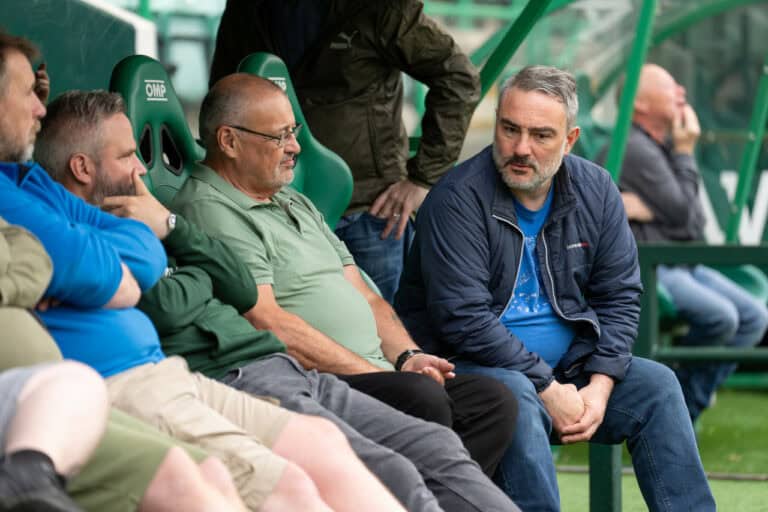
The Changing Room’s 12-week course is a SAMH (Scottish Association for Mental Health) project that works with football club community trusts and foundations across Scotland to support men with their mental health and wellbeing. The course provides a safe space for men to talk openly about their mental health and is delivered by trained Changing Room Coaches. The drop-in sessions (now known as Supporting our Supporters) have been created by men who have participated in The Changing Room and want to give back to the Hibernian Community.
Paul Taylor joined The Changing Room at Easter Road following an acute mental health episode. This is his story.
“I’d been out on a Friday night with workmates. Having had a lot to drink and a great time, I was feeling a wee bit rough on the Saturday. I’d been having trouble sleeping due to arthritis– but didn’t think I’d had any less sleep than I usually did. But when I woke on the Sunday, I was overcome with suicidal thoughts.
I’ve always struggled with low self-esteem. Everybody who knows me would find this hard to believe, as people tend to say I seem to be a nice guy. If I could learn to be nicer to me, that would make a huge difference. My low self-esteem goes all the way back to a period in the early 90s, when I was diagnosed with depression.
Once I’d made the decision to take my life that Sunday, I felt so calm. I said to my wife, Janice, “Right, that’s it. I’m away.” Janice had no reason to assume I was heading anywhere other than a walk to the shops. I stopped off at the cemetery where my parents are buried and told them what I intended to do. What happened next was I bumped into a guy I knew who was telling me all about having just become a dad. After hearing about the love he had for his wife and his family, I started mulling things over. Finally, I phoned Janice and asked her to pick me up. This was all so surreal. Janice arrived, and after speaking for a while, I said, “Right, we’ll go home.” When we got back to the house, I said, “What do I do? I need help.”
Janice suggested I try The Samaritans. So, I phoned their free helpline, 116 123. I was in tears but having someone there to listen to me was such a help. When I asked if I should try NHS24, they said definitely. So, I then dialled 111. Again, they were so helpful, offering to get somebody from the Royal Edinburgh Hospital to speak to me. The Royal Ed got in touch and an appointment was made for the next day. Janice and I went up to the hospital. Having felt at rock bottom, I was just happy to see people who wanted to help. They assessed whether I was in immediate danger and thought I’d be safe to go back home. They organised for their home care team to visit over the next few days and told me they’d get in touch with my GP to put him in the picture, get medication sorted.

I had visits from the home team, initially every day, then every couple of weeks. It was different people, too, which was nice. But every single one of them was so pleasant and polite. In fact, if I look at my life in general, there’s so many people who’ve been kind and caring for me. The guys at work have been so supportive and understanding. And my family. I’d never thought highly of myself, so I didn’t think anyone else should!
A lightbulb moment was finding out about The Changing Room through a post on Hibs.net. I look upon all this as a journey. I think I’ve got the tools for coping, now. All the guys at Changing Room are absolutely brilliant, really. And not one of them, would you look at them and say, he’s obviously got mental health issues because they look just like everybody else. I felt so alone until I came into The Changing Room. Then I spoke to all the guys, and what a revelation that was. One of the words I’ve started using to describe the feeling of becoming part of The Changing Room is humbled. I’m struck by how kind people are. How thoughtful people can be. I’ve never felt so ashamed – for want of a better word – of the action I’d thought of taking. But when I sit there with all the guys, talking, and knowing nothing is ever going to leave the room, it’s just so … humbling. As Janice put it, historically, football is a hub of male society. Maybe more men would be inclined to open up and talk at these meetings if they knew about them.
After Changing Room, we’ve got each other’s numbers. It’s great to have a support network that isn’t pushy. But you’ve got that safety net. We all know each other’s stories. We’ve all had these experiences, some we can recognise, and we can feel safe and comfortable talking about them. If you’ve been through it yourself, you’re more in tune with others who’ve also had issues. But mental health is such a huge thing. It’s just as it’s described in the media, as something that’s hidden, even with people who appear to be well-adjusted. Hopefully, people are now more open to discussing it, to accepting it. It takes people like us to speak about it. It’s not something I ever thought I’d be able to do, but I feel I can. Because now, I’ve got a new set of tools. Changing Room – I can’t praise it enough.”
Hibernian Community Foundation
Easter Road Stadium, 12 Albion Place,
Edinburgh EH7 5QG
Scottish Registered Charity No SC 039699
and registered in Scotland as a Company Limited by Guarantee No SC 345199
© Hibernian Community Foundation – Website by Hype
